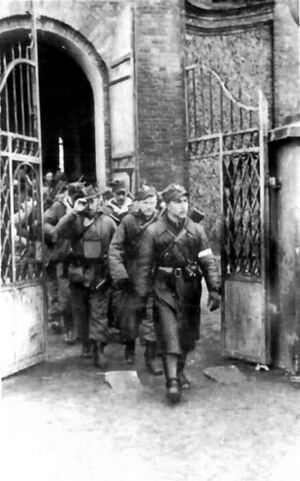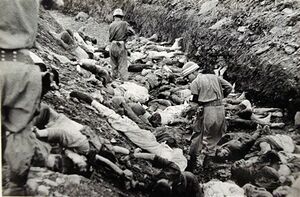Cursed soldiers: Difference between revisions
Jump to navigation
Jump to search
(Created page) |
mNo edit summary |
||
| (10 intermediate revisions by 3 users not shown) | |||
| Line 1: | Line 1: | ||
'''Cursed soldiers''' or '''indomitable soldiers''' (Polish: żołnierze wyklęci, niezłomni) were [[Anti-communism|anti-communist]] fighters in post-World War II [[Poland]]. Their target were mostly Soviet and Polish | [[File:01944 Bury Romuald Rajs.jpg|thumb|3rd Wilno Brigade, ahead is Romuald Rajs "Bury," prominent war criminal]]{{Anti-communism sidebar}} | ||
'''Cursed soldiers''' or '''indomitable soldiers''' (Polish: żołnierze wyklęci, niezłomni) were [[Anti-communism|anti-communist]] fighters in post-[[World War II]] [[Poland]]. Their target were mostly [[Union of Soviet Socialist Republics|Soviet]] and [[Polish People's Republic|Polish]] officials as well as civilians. Nicknames such as "indomitable soldiers" were given by state propaganda after the fall of [[communism]] in the country. In 1947, the anti-communist underground was given an amnesty, after which some partisans continued [[Guerrilla warfare|guerilla warfare]]. | |||
==War crimes== | |||
The Polish anti-communist underground was involved in numerous [[war crimes]], including the killing of minorities such as [[Belarusians]], [[Jews]], [[Ukrainians]] or [[Lithuanians]], Polish [[Communism (ideology)|communists]] and people sympathetic to [[Polish People's Republic]] and robbery:<ref>{{cite web | title=Zbrodnie podziemia powojennego | website=Żołnierze Przeklęci | date=26 Sep 2013 | url=https://zolnierzeprzekleci.wordpress.com/zbrodnie-podziemia-powojennego/ | language=pl | access-date=15 Jun 2024}}</ref>{{Clarify|reason=Is robbery a war crime in this context? Can you make it clearer?}} | |||
* On the 7th of November partisans tried robbing a bus and shot 4 passangers, 8 got injured in Rogienice, Poland<ref>[https://www.bbn.gov.pl/ftp/dok/09/454-483_Kalendarium-od_1951r.pdf Kalendarium – od 1951 r.] (PDF file; in Polish.)</ref> | |||
* 5th Wilno Brigade attacked Lithuanian civilians in the Dubingiai massacre on 23th of June, 1944. Polish commander: Zygmunt Szendzielarz „Łupaszka“<ref>{{cite web | title=Masakra w Dubinkach | website=Żołnierze Przeklęci | date=18 Feb 2013 | url=https://zolnierzeprzekleci.wordpress.com/dubinki/ | language=pl | access-date=15 Jun 2024}}</ref> | |||
==References== | |||
<references /> | |||
{{stub}} | |||
[[Category:Anti-communism]] | |||
Latest revision as of 20:26, 15 June 2024
Cursed soldiers or indomitable soldiers (Polish: żołnierze wyklęci, niezłomni) were anti-communist fighters in post-World War II Poland. Their target were mostly Soviet and Polish officials as well as civilians. Nicknames such as "indomitable soldiers" were given by state propaganda after the fall of communism in the country. In 1947, the anti-communist underground was given an amnesty, after which some partisans continued guerilla warfare.
War crimes
The Polish anti-communist underground was involved in numerous war crimes, including the killing of minorities such as Belarusians, Jews, Ukrainians or Lithuanians, Polish communists and people sympathetic to Polish People's Republic and robbery:[1][clarification needed]
- On the 7th of November partisans tried robbing a bus and shot 4 passangers, 8 got injured in Rogienice, Poland[2]
- 5th Wilno Brigade attacked Lithuanian civilians in the Dubingiai massacre on 23th of June, 1944. Polish commander: Zygmunt Szendzielarz „Łupaszka“[3]
References
- ↑ "Zbrodnie podziemia powojennego". Żołnierze Przeklęci (in polski). 26 Sep 2013. Retrieved 15 Jun 2024.
- ↑ Kalendarium – od 1951 r. (PDF file; in Polish.)
- ↑ "Masakra w Dubinkach". Żołnierze Przeklęci (in polski). 18 Feb 2013. Retrieved 15 Jun 2024.

